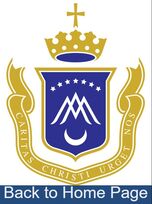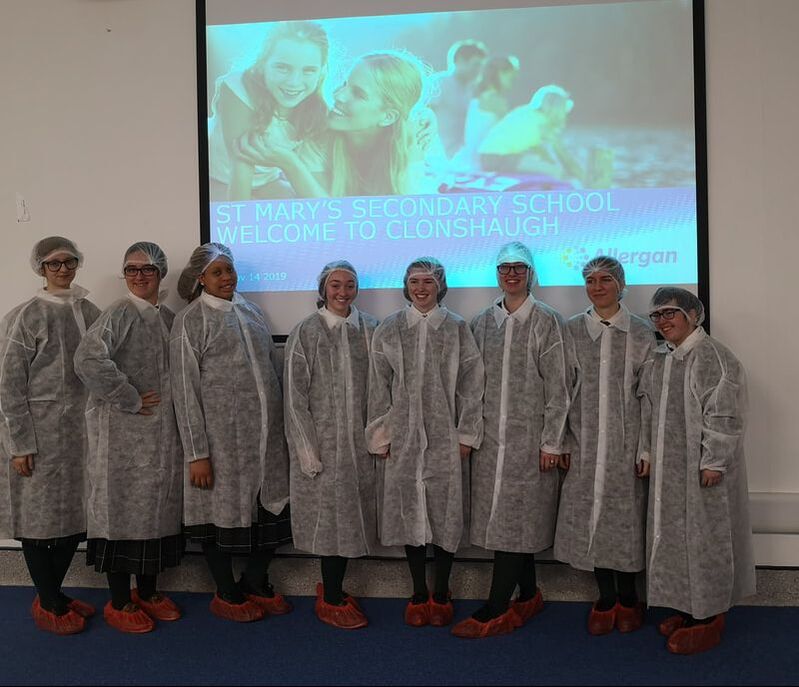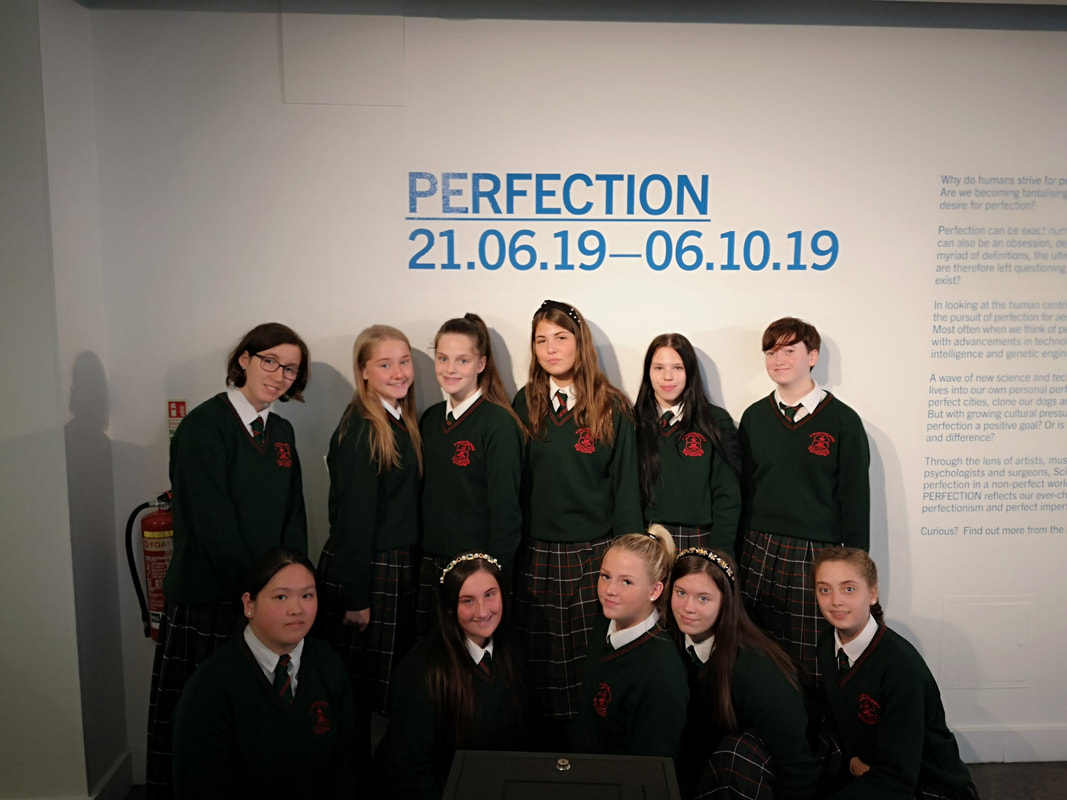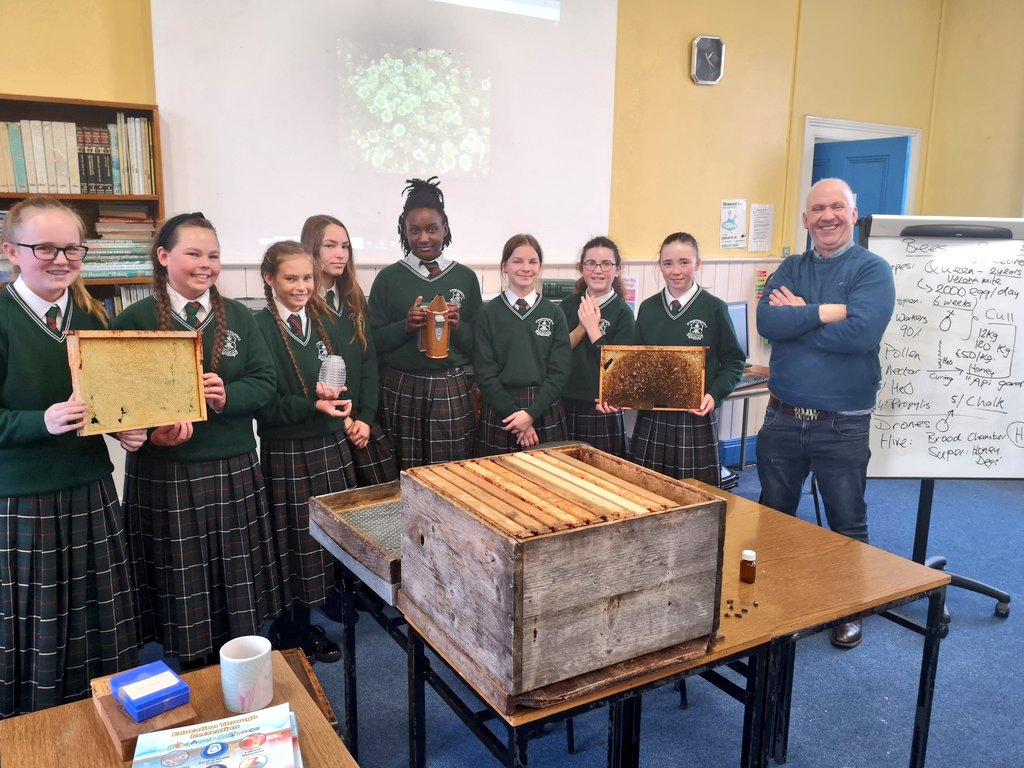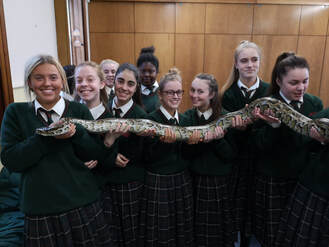St. Mary's Science Department
WEB PAGE UNDER CONSTRUCTION
WEB PAGE UNDER CONSTRUCTION
Science education is important for young people to develop into informed, conscientious and well-rounded members of society. Science teaches us how the world around us works, as well as what happens in our own bodies. In St Mary’s science is mandatory for Junior Cycle, so every student engages in scientific thinking during these years, during which the subject is broken into five strands; Biology, Physics, Chemistry, Earth & Space and Nature of Science. After Junior Cycle, we offer TY modules, and biology and chemistry are offered at Leaving Certificate level.
The school has two fully equipped laboratories where students engage in inquiry-based learning throughout the year. St Mary’s prides itself on having a dedicated Science Department and is currently made of up the following teachers:
The school has two fully equipped laboratories where students engage in inquiry-based learning throughout the year. St Mary’s prides itself on having a dedicated Science Department and is currently made of up the following teachers:
- Ms. Holton - Science/Biology
- Mr. Mulvey - Science/Biology
- Ms. Doyle - Science/Biology/Chemistry
- Mr. Sheridan - Science/Biology/Chemistry
Junior Cycle
Junior Cycle science is broken into five strands; Biology, Physics, Chemistry, Earth & Space and Nature of Science. Nature of Science is an approach to science and examines how scientists work; this is incorporated into all other strands. A list of the main topics can be found below.
Junior Cycle science is broken into five strands; Biology, Physics, Chemistry, Earth & Space and Nature of Science. Nature of Science is an approach to science and examines how scientists work; this is incorporated into all other strands. A list of the main topics can be found below.
Biology
- Living things & cells
- Microbiology
- The digestive system & nutrition
- The respiratory system
- The circulatory system
- Human reproduction
- Photosynthesis
- Respiration
- Genetics, inheritance & variation
- Evolution
- Ecology & conservation
Physics
- Measurement
- States of matter
- Density
- Speed, velocity and acceleration
- Forces
- Energy & energy conversions
- Electricity & electrical circuits
- Physics in society
Chemistry
- Elements, compounds & mixtures
- Solutions
- Separating mixtures
- Acids & bases
- Chemical reactions & rate of reactions
- Atomic structure
- The periodic table
- Sustainability
Earth and Space
- Space and the origin of the universe
- Celestial bodies & the solar system
- The Earth, sun and moon
- The water cycle
- The carbon cycle
- Climate change
Examination
Junior Cycle Science is assessed through a two-hour Common Level exam at the end of Third Year.
The exam is broken into two sections:
Note all the questions carry equal marks.
The number of marks for each question is stated at the top of the question.
You should spend about 50 minutes on Section A and 70 minutes on Section B.
An example of a Junior Cycle science exam can be found here.
You can also find all past exam papers as well as additional sample papers here.
Junior Cycle Science is assessed through a two-hour Common Level exam at the end of Third Year.
The exam is broken into two sections:
- Section A - 10 short questions - 150 marks
- Section B - 6 long questions - 210 marks
Note all the questions carry equal marks.
The number of marks for each question is stated at the top of the question.
You should spend about 50 minutes on Section A and 70 minutes on Section B.
An example of a Junior Cycle science exam can be found here.
You can also find all past exam papers as well as additional sample papers here.
Classroom-based Assessments - CBAs
Two CBAs are conducted in Junior Cycle Science. The teacher assesses the quality of work completed by the student and assigns a descriptor – Exceptional, Above Expectations, In Line with Expectations or Yet to Meet Expectations.
CBA1 - Extended Experimental Investigation
Takes place in Second Year over the course of three weeks, during which students must conduct research, plan an investigation, conduct the investigation and analyse and reflection on their investigation. This involves writing a report on their investigation.
CBA2 - Science in Society Investigation
Takes place in Third Year over the course of three weeks, during which students must conduct research on a topic, evaluate reliability of sources, communicate their findings, and write a report on their findings.
Two CBAs are conducted in Junior Cycle Science. The teacher assesses the quality of work completed by the student and assigns a descriptor – Exceptional, Above Expectations, In Line with Expectations or Yet to Meet Expectations.
CBA1 - Extended Experimental Investigation
Takes place in Second Year over the course of three weeks, during which students must conduct research, plan an investigation, conduct the investigation and analyse and reflection on their investigation. This involves writing a report on their investigation.
CBA2 - Science in Society Investigation
Takes place in Third Year over the course of three weeks, during which students must conduct research on a topic, evaluate reliability of sources, communicate their findings, and write a report on their findings.
|
Transition Year
During Transition Year in St Mary’s, all students must take part in science modules that run over the course of approximately eight to ten weeks. Assessment usually takes the form of a presentation or project to be completed by the students. The modules are normally made up of biology, chemistry, physics and forensic science (including fingerprinting and crime scene analysis). |
Leaving Certificate
For the Leaving Certificate, St Mary’s offers Biology and Chemistry to senior students. These subjects can be taken at either Ordinary Level or Higher Level. Note that there are new curricula being implemented for Leaving Certificate science subjects in the coming years.
For the Leaving Certificate, St Mary’s offers Biology and Chemistry to senior students. These subjects can be taken at either Ordinary Level or Higher Level. Note that there are new curricula being implemented for Leaving Certificate science subjects in the coming years.
Biology
Biology is a natural science concerned with the study of life, living organisms and how they interact with the environment. This subject is broadly broken into three main units; the Study of Life, the Cell and the Organism. Included in this are eighteen mandatory experiments to be completed by students over the two-year course, as well as a field study to be carried out in Sixth Year. Below is a list of the main topics in each unit.
Biology is a natural science concerned with the study of life, living organisms and how they interact with the environment. This subject is broadly broken into three main units; the Study of Life, the Cell and the Organism. Included in this are eighteen mandatory experiments to be completed by students over the two-year course, as well as a field study to be carried out in Sixth Year. Below is a list of the main topics in each unit.
The Study of Life
- The scientific method
- The characteristics of life
- Ecology & the environment
- Study of an ecosystem
The Cell
- Cell structure & diversity
- Diffusion & osmosis
- Cell continuity
- Enzymes & energy carriers
- Photosynthesis
- Respiration
- DNA & RNA
- Genetics & inheritance
- Variation & evolution
The Organism
- Microbiology
- Structure of flowering plants
- Transport, nutrition & food storage in flowering plants
- The human circulation system
- Excretion
- Plant response to stimuli
- The human nervous system
- The senses
- The human endocrine system
- The musculoskeletal system
- The human defence system
- Plant reproduction
- Human reproduction
Assessment
Leaving Certificate Biology is assessed through a three-hour exam at the end of Sixth Year. The exam is broken into three sections:
Not all the questions carry equal marks. The number of marks for each question is stated at the top of the question.
You should spend about 30 minutes on Section A, 30 minutes on Section B, and 120 minutes on Section B.
An example of a Leaving Certificate biology exam can be found here.
You can also find all past exam papers as well as additional sample papers here
Leaving Certificate Biology is assessed through a three-hour exam at the end of Sixth Year. The exam is broken into three sections:
- Section A 7 short questions (100 marks)
- Section B 3 experiment questions (60 marks)
- Section C 7 long questions (240 marks)
Not all the questions carry equal marks. The number of marks for each question is stated at the top of the question.
You should spend about 30 minutes on Section A, 30 minutes on Section B, and 120 minutes on Section B.
An example of a Leaving Certificate biology exam can be found here.
You can also find all past exam papers as well as additional sample papers here
Chemistry
Chemistry is the study of matter, what matter is made of, its properties and how it interacts with the world. Chemistry is often called the ‘Central Science’ and can be seen as complementary to all other science subjects. There is a heavy emphasis on practical work in chemistry, with over thirty mandatory experiments to be completed by students over the two-year course. Below is a list of the main topics in the subject.
Chemistry is the study of matter, what matter is made of, its properties and how it interacts with the world. Chemistry is often called the ‘Central Science’ and can be seen as complementary to all other science subjects. There is a heavy emphasis on practical work in chemistry, with over thirty mandatory experiments to be completed by students over the two-year course. Below is a list of the main topics in the subject.
|
|
Assessment
Leaving Certificate Chemistry is assessed through a three-hour exam at the end of Sixth Year. The exam is broken into two sections:
All the questions carry equal marks.
The number of marks for each question is stated at the top of the question.
You should spend about 20 minutes on each question.
An example of a Leaving Certificate chemistry exam can be found here.
You can also find all past exam papers as well as additional sample papers here.
Leaving Certificate Chemistry is assessed through a three-hour exam at the end of Sixth Year. The exam is broken into two sections:
- Section A: 3 experiment questions
- Section B: 7 theory questions
All the questions carry equal marks.
The number of marks for each question is stated at the top of the question.
You should spend about 20 minutes on each question.
An example of a Leaving Certificate chemistry exam can be found here.
You can also find all past exam papers as well as additional sample papers here.
Events held during the year
The science department actively encourages student involvement in various science-related activities. These activities include:
The science department actively encourages student involvement in various science-related activities. These activities include:
- External speakers
- Science Week
- Science club
- Ecology field study in Tayto Park (now Emerald Park)
- Chemistry trip to water treatment plant
- Visits to third-level institutes
Careers
Science subjects are very useful for career prospects as students who take these subject develop key skills that can be applied to any job, such as critical thinking, problem solving and analytical skills.
Many careers directly involve a knowledge of science – for example Biotechnology, Medicine, Veterinary Medicine, Dentistry, Food Science, Engineering, Environmental Science, Forensic Science, Agricultural Science, Pharmacy, and Medicinal Chemistry. Many third level courses require science subjects to be taken for Leaving Certificate.
Science subjects are very useful for career prospects as students who take these subject develop key skills that can be applied to any job, such as critical thinking, problem solving and analytical skills.
Many careers directly involve a knowledge of science – for example Biotechnology, Medicine, Veterinary Medicine, Dentistry, Food Science, Engineering, Environmental Science, Forensic Science, Agricultural Science, Pharmacy, and Medicinal Chemistry. Many third level courses require science subjects to be taken for Leaving Certificate.
Links
Instagram: www.instagram.com/stmarysmathssci
JC Science Specification: www.curriculumonline.ie/getmedia/f668d804-6283-4d4a-84ab-c71e5b37d198/Specification-for-Junior-Cycle-Science.pdf
LC Chemistry Syllabus: www.curriculumonline.ie/getmedia/7bdd3def-f492-432f-886f-35fc56bd3544/SCSEC09_Chemistry_syllabus_Eng.pdf
LC Biology Syllabus: www.curriculumonline.ie/getmedia/0cc3a7ac-fd8c-4612-8e4d-81cd82482abc/SCSEC07_Biology_Syllabus_Eng.pdf
Subject specific websites
Biology Bugbears: www.youtube.com/channel/UCGuBY43N719wlQ0e17nbKRQ
The Conical Flask: www.theconicalflask.ie
The Physics Teacher: www.thephysicsteacher.ie
Leaving Cert Chemistry Experiments (PDST): www.youtube.com/playlist?list=PLIMUgukfSJoke--asiI9Oy9Hd-OSw12Rm
NASA: www.nasa.gov
Instagram: www.instagram.com/stmarysmathssci
JC Science Specification: www.curriculumonline.ie/getmedia/f668d804-6283-4d4a-84ab-c71e5b37d198/Specification-for-Junior-Cycle-Science.pdf
LC Chemistry Syllabus: www.curriculumonline.ie/getmedia/7bdd3def-f492-432f-886f-35fc56bd3544/SCSEC09_Chemistry_syllabus_Eng.pdf
LC Biology Syllabus: www.curriculumonline.ie/getmedia/0cc3a7ac-fd8c-4612-8e4d-81cd82482abc/SCSEC07_Biology_Syllabus_Eng.pdf
Subject specific websites
Biology Bugbears: www.youtube.com/channel/UCGuBY43N719wlQ0e17nbKRQ
The Conical Flask: www.theconicalflask.ie
The Physics Teacher: www.thephysicsteacher.ie
Leaving Cert Chemistry Experiments (PDST): www.youtube.com/playlist?list=PLIMUgukfSJoke--asiI9Oy9Hd-OSw12Rm
NASA: www.nasa.gov
